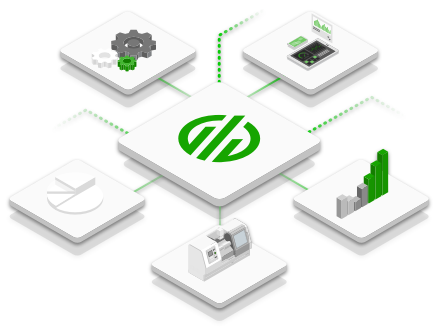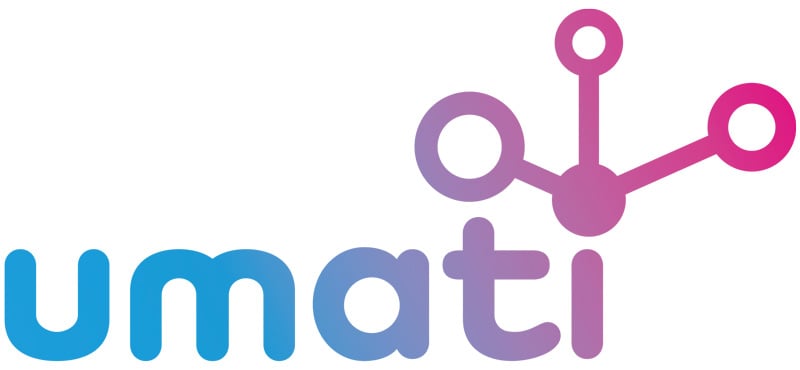MTConnect provides a machine to machine or machine to enterprise communication vocabulary that ensures equipment with similar standardized functions can communicate.
Industrial Communication Protocols
Industrial Automation Protocols are designed to connect machine assets and manufacturing systems, enabling visibility into production performance and machine health.
Manufacturers can automate data collection by capturing machine data at the edge using a variety of industrial control system (ICS) protocols.
Search by industrial protocols to learn how they support the transfer of data as well as which equipment each is compatible with.


OPC UA
OPC-UA is a machine-to-machine and machine to enterprise communication protocol for industrial automation. Thus, it ensures diverse automation systems are compatible with one another within a unified architecture that facilitates interoperability.

EtherNet/IP
EtherNet/IP is a widely used industrial network protocol that adapts the Common Industrial Protocol (CIP) to standard Ethernet, enabling Internet and enterprise connectivity.

Fanuc FOCAS
FOCAS is the standard protocol for collecting data from FANUC Controls. FANUC controls are used worldwide by many well-known machine tool brands, including Tsugami, Citizen, STAR, Doosan and Matsuura

Modbus
Modbus is a serial communication protocol originally developed in 1979. A well known protocol historically used in SCADA systems, there exist many variants of Modbus protocols.

LSV/2
The LSV/2 protocol module has the ability to control robots, CNC machines, and other machine systems by transmitting machine-specific commands and responses with any LSV/2 compatible control.

TCP/IP
TCP/IP (Transmission Control Protocol/Internet Protocol) is a suite of protocols used to connect devices to the internet, and can also be used as a communications protocol in a private network.
IO-Link
IO-Link is a globally-recognized point-to-point serial communication protocol used to communicate with sensors and/or actuators.

Umati
Universal Machine Technology Interface (UMATI) facilitates the data exchange between machines, components, and installations and their integration into customer and user-specific IT ecosystems.

Industrial Protocols: Unlocking Industrial Communication, Automation, and Control
What are Industrial Protocols?
Industrial Protocols are communications protocols that ensure connectivity between machines, devices, and systems as part of an industrial network.
Communication protocols enable industrial communication so managers can have greater visibility and control of their operations. With connected PLCs, machine controls, HMIs, sensors, and systems, manufacturers can overcome data siloes and drive industrial automation.
Historically, industrial communication was based on serial connections, resulting in many protocols that continue to be used today, such as Modbus and Profibus. The industry as a whole has begun to move to industrial ethernet communication protocols. The reason for this is that Ethernet is faster, more reliable, and has greater flexibility compared to serial communication. This has resulted in industrial protocols such as EtherNet/IP and Profinet.
There are now many, many communications protocols available, depending on various factors including equipment and devices in use, networks, and the goal of the control system.
Why are there Different Industrial Communication Protocols?
The reason that there exist so many different industrial protocols is that they have historically been developed by the many hardware vendors that service industrial environments. In an attempt to develop competitive advantages and solve specific problems, these vendors have built many proprietary protocols that helped to network certain equipment and systems.
Standards have arisen in an effort to bridge the gap among these incompatible protocols. After all, manufacturers have any number of devices, machines, and systems as part of their operation. They do not want to rely on a single vendor, but rather seek flexible and interoperable solutions that enable connectivity across makes and models of equipment.
Vendors are now developing protocols that are often compatible with given standards, enabling easier connectivity to the rest of the shop floor environment.
What is the Most Commonly Used Industrial Protocol?
The most commonly used protocol in industrial settings is Modbus. Developed in 1979 by Modicon for use with their PLCs, it is now managed by the Modbus Organization. Modbus is an open standard, easy to implement, and is widely adopted by vendors.
There are multiple Modbus standards, with Modbus RTU being the most commonly used, and Modbus TCP/IP closely behind.
What Are the Different Industrial Communication Protocols?
As you can imagine, there are many industrial protocols available. Here is a list that includes many of the existing protocols, but it is by no means comprehensive:
- ANSI C12.18
- ANSI C12.21
- ANSI C12.22
- AS-i
- BSAP
- CC-Link Industrial Networks
- CIP (Common Industrial Protocol)
- Controller Area Network or CAN bus
- ControlNet
- Data Distribution Service (DDS)
- DeviceNet
- DF-1
- DirectNet
- DLMS/IEC 62056
- DNP3 – Distributed Network Protocol
- EtherCAT
- Ethernet Global Data (EGD)
- Ethernet Powerlink
- EtherNet/IP
- Fanuc Focas
- FINS
- FOUNDATION fieldbus
- GE SRTP
- GPRS
- Hart
- Honeywell SDS
- HostLink Protocol
- I2C
- IEC 60870-5
- IEC 61107
- IEC 61850
- IEC 62351
- Interbus
- IO-Link
- LSV-2
- M-Bus
- MACRO Fieldbus
- MECHATROLINK
- MelsecNet
- MelsecNet II
- MelsecNet/B
- MelsecNet/H
- Modbus
- Modbus ASCII
- Modbus PEMEX
- Modbus Plus
- Modbus RTU
- Modbus TCP/IP
- MPI
- MTConnect
- OMS
- OPC
- OPC UA
- OpenADR
- Optomux
- OSGP
- PieP
- Profibus
- PROFINET
- PROFINET IO
- RAPIEnet
- RS-232
- RS-485
- SERCOS III
- SERCOS interface
- Sinec H1
- SSCNET
- SynqNet
- TCP/IP
- TTEthernet
- Umati
- ZigBee Smart Energy 2.0